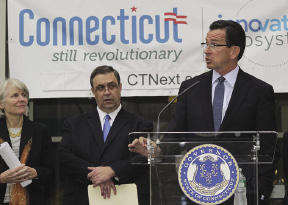With 37,600 private sector jobs created since Governor Malloy took office, the results of his economic development policies are beginning to show.
After an instructional Jobs Tour in the summer of 2011, and after gaining true bipartisan support, the Governor called a special session on jobs later that same year. This historic legislation called for new tools, new approaches and new energy to stimulate and transform Connecticut's economy. The ensuing economic development strategy built upon the state's strengths and addressed its issues. Execution on all aspects began immediately and the impact is already being felt.
Connecticut is building momentum and getting noticed. Already, other states are looking to emulate our Small Business Express Program, one of the cornerstones of the Jobs Bill. This program has already helped nearly 800 small companies undertake expansion projects, enter new markets and create hundreds of new jobs.
Education
But economic incentives are only a small part of the strategy. We listened to the business community. They were loud and clear: talent is the number one reason they like doing business in Connecticut. These companies need to know there is a pipeline of talent who possess the skills necessary for the job. That's why, in partnership with UConn and the public university system, community colleges and technical schools, investment in education is a cornerstone of the plans for future progress in the state.
Demand for skilled level talent is large and growing in Connecticut, especially since our economic future will be built through innovation in the fields of science, technology, engineering and math. With the active support of over one hundred businesses, business organizations, and labor and civic organizations, the legislature recently has passed the $1.5 billion Next Generation Connecticut initiative. At a time when most other states are cutting funding for higher education, Next Generation Connecticut is one of the most extensive and forward-looking undertakings anywhere in the United States. Next Generation Connecticut will expand the University of Connecticut faculty by over 250 positions, and enroll an additional 6,580 undergraduates, and make investments in facilities for research and instruction in materials science, physics, biology, engineering, cognitive science, genomics, and related fields.
Innovation
Innovation is also core strength of the state. Already a leader in patents, ranking 8th in the nation, and in venture capital deals, ranking 7th, we've launched Connecticut's innovation ecosystem, a robust network of resources to attract and retain young startup businesses and nurture a culture of entrepreneurship.
A recognized leader - ranking 1st per capita in the United States in business research and development investments - Connecticut stands out in several fields. One outstanding example is bioscience. The new Bioscience Connecticut fund will provide $200 million over the next 10 years to further the research investment in the UConn Health Center and strategic relationship with JAX Genomic Medicine, which are already boosting the state's reputation as a global destination for medical research and technology.
Infrastructure
Using techniques taken from the private sector, Connecticut state government is also "leaning" up our processes, enabling us to better compete on a global basis; to be a sharp and agile competitor, working closely with private industry and educational institutions to help our state reclaim its historic reputation as a global destination for talent and investment. Governor Malloy also launched two critical initiatives to address key infrastructure areas: A comprehensive Energy Policy and Transform CT.
We need lower energy costs. Already under the Malloy administration, energy costs have declined 12%. The newly adopted Energy Policy provides a roadmap for investment that will bring even cheaper, cleaner and more reliable energy to businesses and homes throughout our state.
Transform CT (www.TransformCT.org) is a new strategic planning approach to transportation policies and projects that will engage stakeholders in the process of developing a multi-modal blueprint supporting Connecticut's already strong position in global trade.
Why Connecticut?
Connecticut has one of the highest quality of life ratings in the country. That's why we are successfully attracting Fortune 500 company headquarters like CIGNA and Charter Communications, bringing to 16 the number of Fortune 500 leaders who choose to come to or remain in Connecticut. Furthermore, Connecticut recently earned the top position in the Measure of America report, which addresses not just economic growth but quality of life.
The evidence that our strategic plan is working is growing. With continued focus on execution of the strategy, I am sure our best days are still ahead.
Catherine Smith is commissioner for the Department of Economic and Community Development for the State of Connecticut.












